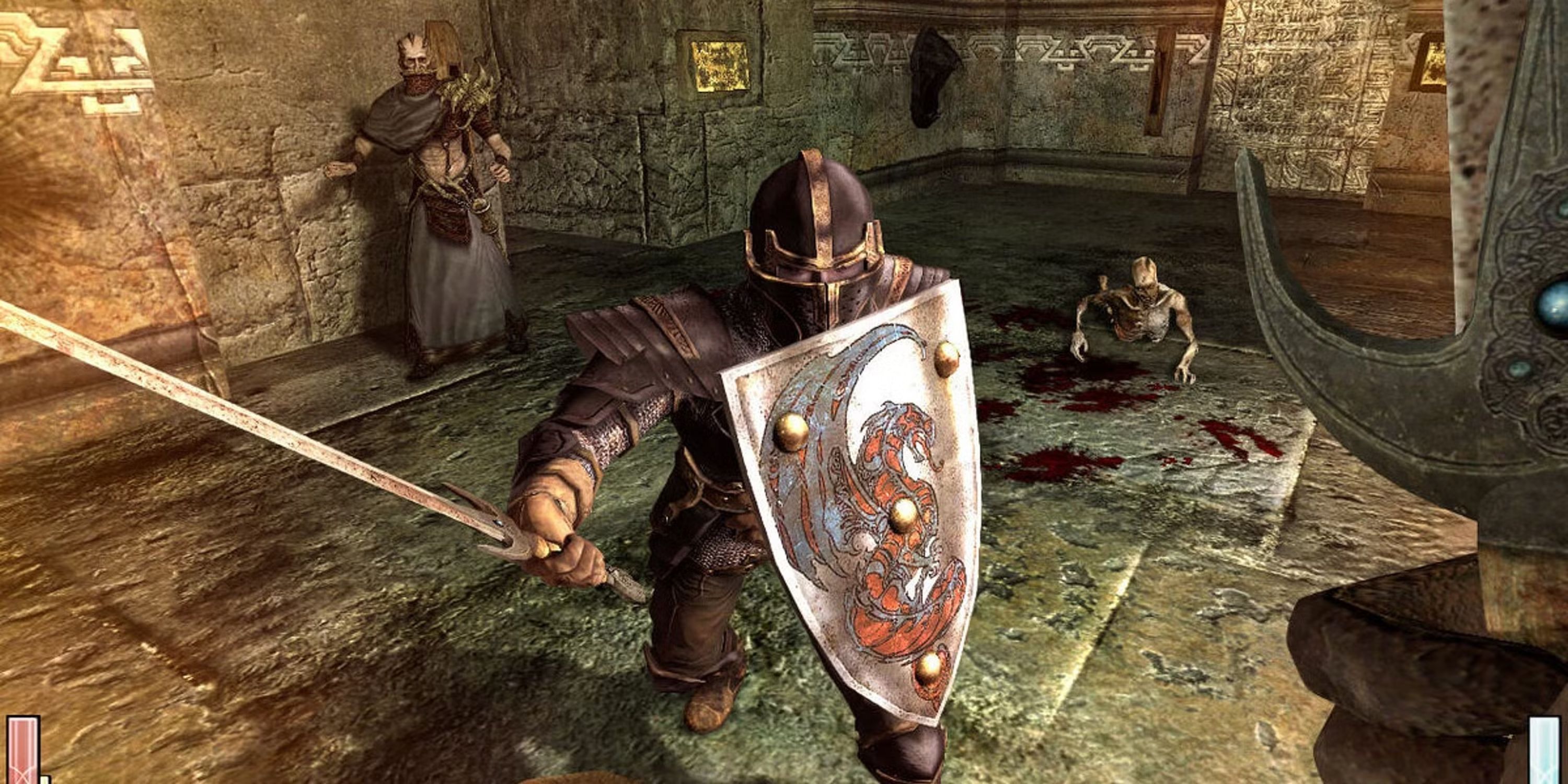
Summary
- Games like Dark Messiah and Dragon’s Dogma offer powerful magic systems for players to experiment with and feel like walking nukes.
- Titles such as Elder Scrolls 5 and Divinity: Original Sin 2 let mages rewrite the rules, becoming overpowered reality-warping forces.
- World of Warcraft and Baldur’s Gate 3 showcase the God complex mages, defining gameplay encounters and meta across decades.
There’s something timeless about the fantasy of being a mage. It’s not just about throwing fireballs and summoning ice storms, though that’s undeniably part of the fun. It’s about having control. Control over elements, minds, time, fate, and in some cases, entire timelines.
A powerful mage isn’t just a damage dealer in a robe. They’re the secret weapon, the walking nuke, the solution to problems that haven’t even happened yet. Some games understand this better than others. And the ones that do? They let players rewrite the rules of engagement entirely. Here are the games that take magic seriously, where playing as a mage doesn’t feel like a class choice, but a statement.
Dark Messiah Of Might And Magic
Some Men Just Want To Kick Orcs Into Spikes… With Fire
Released during that brief window when Ubisoft was doing interesting things with Source Engine physics, Dark Messiah still holds up as a wild ride of chaos, especially for players who spec into magic. The game rewards creativity, and being a mage here means being an environmental terrorist. Fireball a bridge and watch goblins plummet into spikes. Use telekinesis to throw barrels. Freeze the ground so a charging orc breaks his neck on your terms.
It’s not a sprawling RPG, but that works in its favor. The spell selection is lean, but every ability feels purpose-built for maximum carnage. Combining spells with the game’s infamous kick mechanic turns even basic fights into cartoonishly violent spectacles. Players who want to feel smart, brutal, and overpowered all at once won’t find a better playground than this weird, wonderful cult classic.
Dragon’s Dogma: Dark Arisen
You Can’t Out-Sword Someone Who Controls Time And Space
Dragon’s Dogma does not waste time trying to make mages feel grounded or balanced. Casting a single spell as a Sorcerer often takes a few tense seconds, but once it lands, it’s like someone dropped a god on the battlefield. High-tier incantations like Maelstrom or Bolide can flatten dozens of enemies at once. And the game’s physics-driven combat lets spells ripple through the terrain and enemy mobs in ways that feel unscripted and violent.
But the real magic is in the spell variety. One moment, players are summoning tornados, the next they’re freezing wyverns midair or teleporting short distances with skillful use of Levin spam. Magic even feels different depending on the class. Playing as a Mage means healing and utility, but choosing Sorcerer unlocks the destructive stuff that turns forts into smoldering craters. Capcom made sure magic wasn’t just viable. It’s downright nuclear.
Fireball Spam All Day Long
At first glance, Skyrim doesn’t seem like a power fantasy for mages. Early-game spellcasting feels underwhelming, especially compared to stealth archers who one-shot dragons from bushes. But push past the early slog, and magic becomes absurdly potent. Chain-lightning groups of enemies into ash. Paralyze giants mid-swing. Equip double-cast destruction spells and walk through forts like an arcane war machine.
There’s also the modding community, which has essentially rewritten what it means to be a mage in Skyrim. Mods like Apocalypse or Ordinator add dozens of new spells and perks, turning the Dragonborn into a reality-warping horror. By late-game, a fully built mage can trap souls, manipulate weather, conjure Daedric armies, and make Alduin feel like a mid-level mob. Bethesda didn’t balance mages. They let them loose.
Divinity: Original Sin 2
When The Magic Feels Like It Was Etched Into The Bones Of The World
Larian Studios didn’t just build a good magic system. They built a canvas where every element reacts to the next. In Divinity: Original Sin 2, casting a rain spell creates puddles, which can then be electrified to stun enemies or frozen into slippery traps. Poison clouds explode with fire. Cursed surfaces evolve mid-combat. Magic in this game feels like chemistry class taught by a pyromaniac.
What makes it better is that none of this is happening in a vacuum. Playing as a mage in Original Sin 2 isn’t just about combat. It’s about dialogue checks, quest outcomes, and character identity. Origin characters like Fane and Lohse bring their own magical baggage that shapes how NPCs respond and how events unfold.
World Of Warcraft
The OG God Complex Simulator
Mages in World of Warcraft have been melting faces since 2004. Whether it’s arcane bombs in PvP or blizzard pulls in dungeon runs, the class has always been about high-risk, high-reward devastation. Frost offers crowd control. Fire delivers crit-based carnage. Arcane lets players manage mana like they’re conducting a nuclear reactor.
What really cements WoW mages as iconic is how they’ve shaped the game’s meta across decades. Some of the most famous arena comps, like Rogue/Mage/Priest, revolved around the mage’s toolkit. Blink to dodge a stun. Spellsteal a crucial buff. Polymorph a healer at the perfect moment. Even outside of combat, mages teleport entire raids, conjure food and water, and solo content with laughable ease. In Azeroth, mages define encounters.
Baldur’s Gate 3
What Dungeons & Dragons Always Promised
What Baldur’s Gate 3 gets right, better than any other RPG, is making magic feel like it’s woven into every system. Players can push enemies off cliffs with Thunderwave, disguise themselves mid-quest with Alter Self, or shut down entire fights with a well-placed Hold Person. The depth comes from its DnD 5e foundation, but Larian made sure it still feels intuitive in combat and creative outside it.
Even cantrips like Fire Bolt or Eldritch Blast matter, scaling with level and gaining tactical relevance. Classes like Sorcerer or Wizard offer wild flexibility. Want to twin-cast Haste and make two allies into hyper-speed death machines? Or cast Wall of Fire in a bottleneck and cook everything trying to pass? It’s all fair game. Add in the reactive world design and multiple-party synergies, and playing a mage in Baldur’s Gate 3 feels like cheating the laws of the universe.
Dragon Age: Origins
Where Every Spell Feels Like It Has A Soul
Bioware has never made spellcasting feel more consequential than in Dragon Age: Origins. Magic is feared in the world, and for good reason. A single misstep can turn a mage into an abomination. That tension seeps into every encounter. Spells hit hard and often affect friend and foe alike, encouraging players to think ahead rather than just spam fireballs.
The variety is staggering. Blood Magic lets players power spells using their own health. Walking Bomb turns enemies into explosive liabilities. Force Field can remove a boss from combat for several seconds. Combine that with unique specializations like Arcane Warrior and Spirit Healer, and the result is a mage that feels like a walking paradox; fragile yet unstoppable, studied yet chaotic. Even the dialogue reflects it. Being a mage in Ferelden isn’t just a playstyle. It’s a political identity.
#Games #Play #Powerful #Mage

